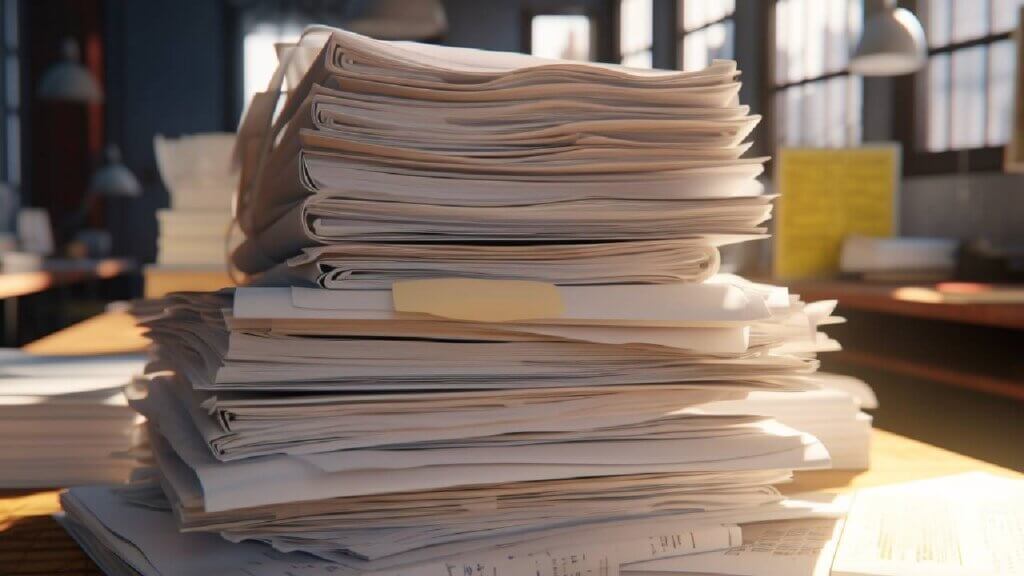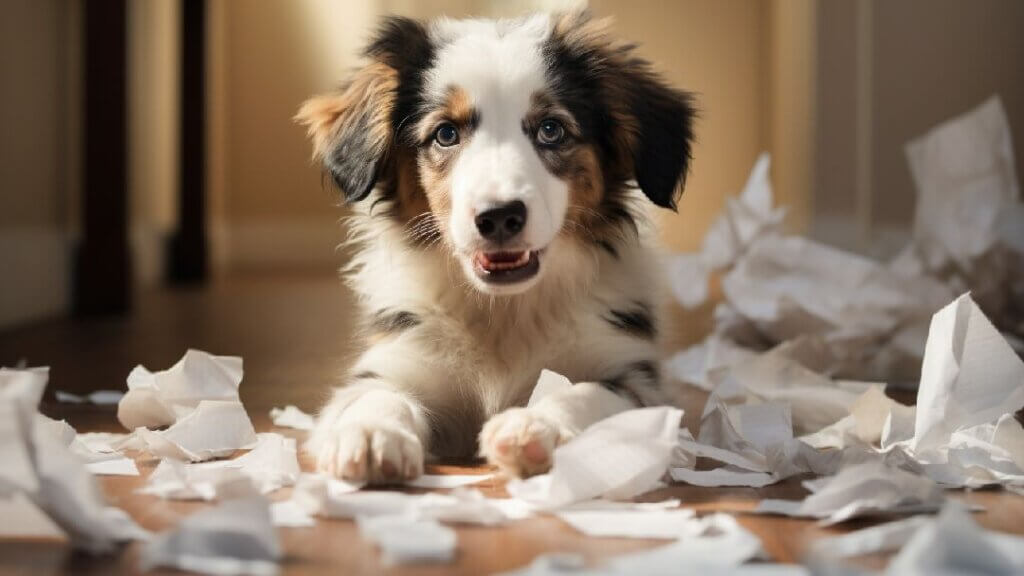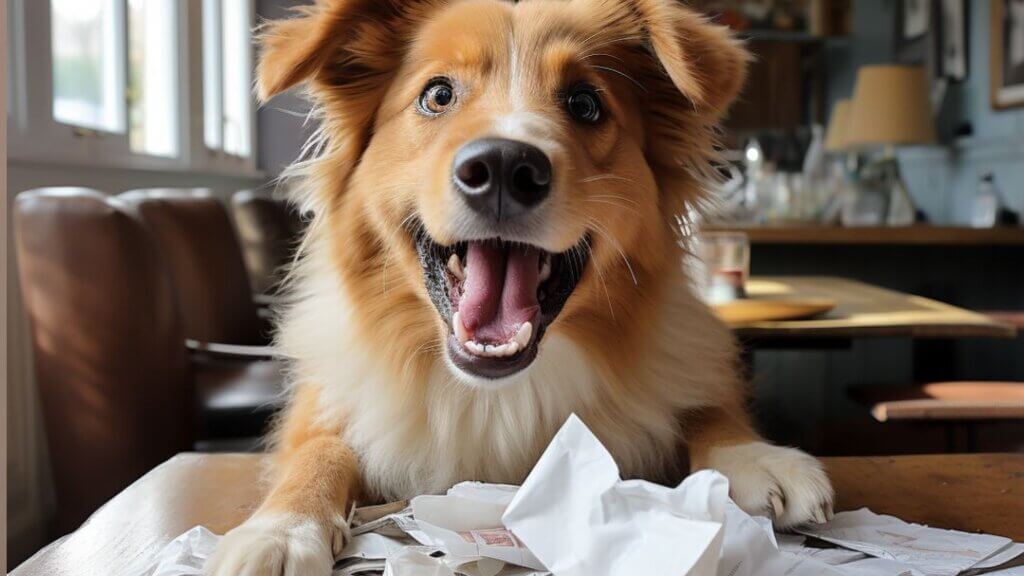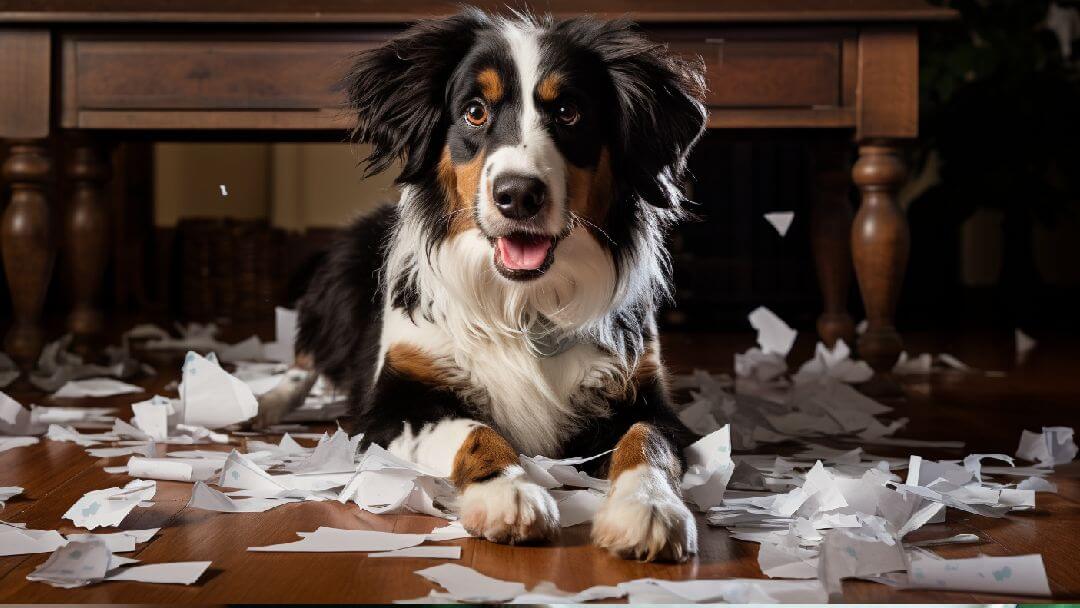One peculiar habit that both baffles and amuses pet owners is the tendency of some dogs to indulge in paper munching. From tissue to cardboard, it seems no paper product is safe from their curious jaws.
The image of a mischievous pup tearing into a book or newspaper might be familiar to many, leaving pet owners wondering, what compels our furry friends to indulge in such a peculiar habit? Let’s unravel this mystery together.
What is Eating Paper?
Before we delve into why dogs devour paper, let’s look at what this behavior entails. “Eating paper” is a term that encompasses the act of dogs chewing, tearing, and, in some instances, swallowing various types of paper.
This quirky habit, rooted in instinct and curiosity, often stems from a combination of teething discomfort, boredom, or a primal urge to explore the world through taste
Behavioral Causes of Paper Eating
To truly comprehend why dogs perform this unique behavior, we must unravel why dogs eat paper.
1. Exploratory behavior
Dogs are naturally curious creatures, especially puppies; they use their mouths to explore the world around them. Paper has a unique texture and taste, making it a target for dogs to investigate and understand their environment.
2. Nutritional deficiency
In some cases, dogs may eat non-food items like paper due to a nutritional deficiency. If their diet lacks essential nutrients, they might use unconventional items to fulfill specific cravings.
3. Boredom
Dogs, particularly those left alone for extended periods, may use paper chewing as entertainment. Boredom can lead to destructive behaviors, and paper provides an easily accessible outlet for their pent-up energy.
4. Attention-seeking behavior
Dogs often resort to attention-seeking actions, and paper munching might be a way to grab your focus. If they’ve learned that tearing paper elicits a positive or negative reaction, they may continue this behavior as a means of communication.
5. Stress and anxiety
Like humans, dogs resort to certain behaviors when stressed or anxious. Chewing on paper can serve as a coping mechanism. Understanding stress triggers in dogs can help address the root cause of this behavior.

Dog Eating Habits Unraveled
A combination of factors, including instinct, environment, and individual personality, influences canine eating habits.
Instinctual behaviors
Dogs use their mouths to explore the world, mirroring the behavior of their wild ancestors. Chewing is also an instinct that not only aids in dental health by reducing plaque but also serves as a stress reliever.
Environmental influences
Dogs adapt their eating habits based on the availability of resources. If the paper is within reach, some dogs may consider it fair game.
Individual variations
Just like humans have food preferences, dogs exhibit individual variations in their eating habits. Some dogs may develop a penchant for paper due to personal preferences or past experiences.
Paper Ingestion in Dogs
Understanding what happens when a dog swallows paper is crucial for pet owners. Here are critical insights into paper ingestion in dogs:
Digestive journey
Once swallowed, the paper embarks on a journey through the digestive system. While some paper may pass harmlessly through, large or indigestible pieces can pose risks.
Potential obstruction
Ingested paper may cause blockages in the digestive tract, leading to serious health issues. Identifying signs of distress, such as vomiting or lethargy, is crucial to prompt intervention.
Monitoring output
Regularly monitoring a dog’s feces can provide insights into whether the ingested paper has passed through their system. Any signs of distress should prompt a visit to the veterinarian.

Health Risks of Eating Paper in Dogs
Dogs consuming paper can pose health risks that extend beyond mere inconvenience. Some key risks include:
Gastrointestinal issues
Paper ingestion can lead to stomach upset, indigestion, and diarrhea. It may cause inflammation and damage to the gastrointestinal tract in severe cases.
Choking hazard
Dogs might inadvertently swallow large pieces of paper, leading to a choking hazard. This risk is exceptionally high if the paper is crumpled or torn into sizable fragments.
Foreign body obstruction
The most serious risk is the potential for a foreign body obstruction. Large amounts of ingested paper can accumulate and obstruct the digestive tract, requiring immediate veterinary attention.
Key Strategies in Preventing Dogs From Eating Paper
Preventing dogs from eating paper involves implementing several strategies to curb this behavior. These strategies include:
- Supervision and redirection
Keep a close eye on your furry friend, redirecting their attention when they show interest in paper. Substitute with dog-friendly toys to satisfy their chewing instinct.
- Provide mental stimulation
Engage your dog’s mind with puzzle toys and interactive games. Mental stimulation can reduce boredom, a common cause of paper chewing.
- Proper exercise
Ensure your dog gets enough physical activity. Regular walks and playtime can alleviate stress and reduce the likelihood of destructive behaviors.
- Use taste deterrents
Apply safe taste deterrents on paper or invest in dog-friendly deterrent sprays. These substances deter dogs from chewing on items with unpleasant tastes.
- Positive reinforcement
Reward good behavior with treats and praise. When your dog avoids paper or follows a command, reinforce the positive behavior to encourage long-term habits.

Cost of Eating Paper
Dogs ingesting paper can lead to various costs, both financially and in terms of their health.
Veterinary bills may arise due to digestive issues, blockages, or other health complications. Additionally, the emotional cost of seeing your pet in discomfort can be significant.
Conclusion
Understanding why dogs eat paper empowers owners to take proactive measures. By implementing preventative strategies, being aware of potential costs, and correcting bad behavior with positive reinforcement, we can create a safe and enriching environment for our canine companions.

FAQs
Can I train my dog to stop eating paper?
Training can help curb this behavior. Provide appropriate chew toys, use positive reinforcement when your dog chooses them over paper, and ensure a stimulating environment to minimize boredom-related paper munching.
Are certain types of paper more attractive to dogs?
Dogs may be drawn to paper with interesting smells, such as food wrappers or those with a crinkly texture. Understanding your dog’s preferences can aid in preventing access to paper.
Are certain breeds more prone to eating paper?
While individual tendencies vary, some breeds, especially those with a strong chewing instinct, may be more prone to paper consumption. A dog’s personality and habits have more influence on this behavior than its breed.
Can paper-eating behavior be hereditary among dog breeds?
While heredity can influence behaviors, paper-eating behavior is more commonly learned or influenced by environmental factors.
Are there age-related factors influencing paper-eating behavior?
Teething puppies may chew on various items, including paper, to alleviate discomfort. Older dogs may use paper chewing due to dental issues or cognitive changes.






my dogo is not even interested in…
mine wouldn’t eat paper even if it was very hungry